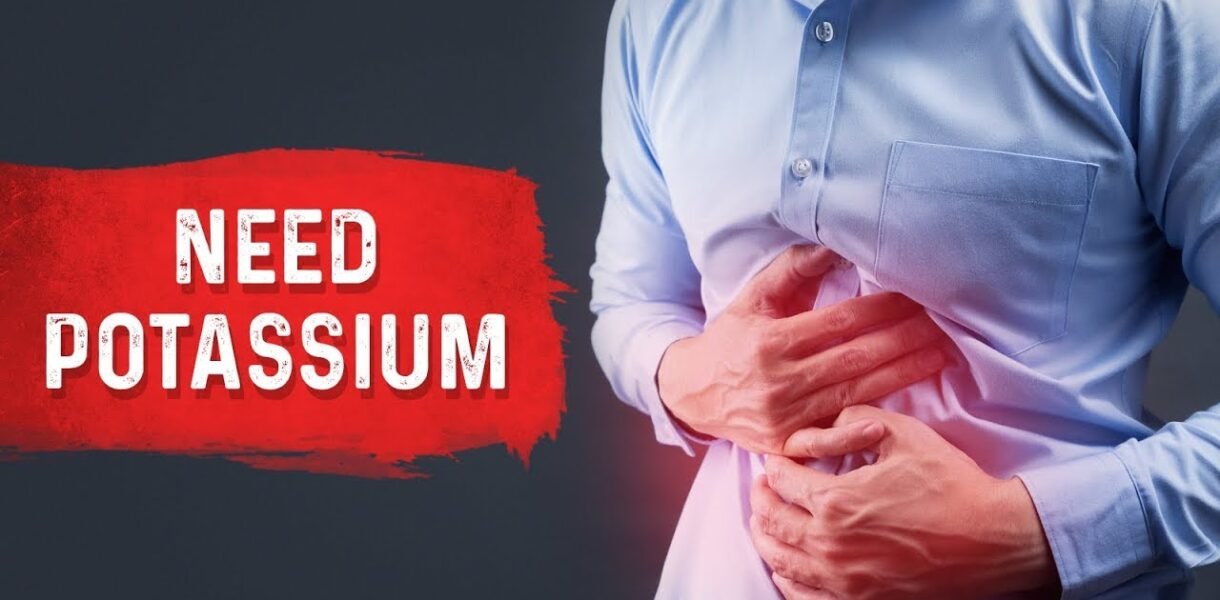Table of Contents

Understand the crucial role of potassium in stomach acid production. Learn how low potassium levels can lead to low stomach acid, affecting digestion and overall health.
Potassium is a vital mineral that plays a crucial role in numerous bodily functions, including the production of stomach acid. Stomach acid, or hydrochloric acid (HCl), is essential for proper digestion and nutrient absorption.
| Topic | Information |
|---|---|
| Role of Potassium in Stomach Acid Production | Potassium is essential for the production of hydrochloric acid (HCl) in the stomach. |
| Symptoms of Low Stomach Acid | Bloating, indigestion, heartburn, nausea, nutrient deficiencies, increased infection risk. |
| Sources of Potassium | Leafy greens, bananas, avocados, beans, nuts, seeds, and fish. |
| Recommendations | Increase potassium intake through diet and supplements, consider Betaine HCL for low stomach acid. |
| How to Increase Potassium Intake | Eat potassium-rich foods and consider potassium supplements if needed. Consult a healthcare provider first. |
Low levels of stomach acid can lead to various digestive issues, such as bloating, heartburn, and nutrient deficiencies. In this article,
Dr. Berg explores the intricate relationship between potassium and stomach acid production. Potassium activates the gastric H+,K+-ATPase enzyme, which is responsible for secreting hydrochloric acid into the stomach. Discover the symptoms of low stomach acid, the importance of maintaining adequate potassium levels, and the best dietary sources of potassium.
Learn how to ensure you get the recommended daily intake of potassium to support optimal stomach acid production and overall digestive health.
How Potassium Enhances Stomach Acid Production for Optimal Digestion
Today I’m gonna talk about the relationship between potassium and stomach acid .
Like that’s hydrochloric acid .

In other Topices, I’m always recommending taking , calcified vinegar for digestion to help increase the acidity of the stomach and sometimes betaine hydrochloride , sea salt to help the , build up the chlorides to make hydrochloric acid , but there’s another nutrient that is critical in making stomach acid .
And that is potassium .
If you don’t have enough potassium , it’s gonna be very difficult to make hydrochloric acid .
But let’s talk first about the symptoms if you’re low in stomach acid .
You’re not going to be able to digest red meat .
You’re not going to like it .
It’s going to make you feel bad .
You’re just not going to want it .
And , it’s gonna create bloating , gas , belching , burping , constipation , and then acid reflux eventually .
These are some of the symptoms .
Essential Sources of Potassium to Boost Stomach Acid Production and Improve Digestion
So , in addition to taking hydrochloric acid , you wanna make sure you have enough potassium as well .
Where do you get that ?
Vegetables , very key source .
Potassium is also in red meat and other meats and even chicken , but not as much .

Avocados , beet leaves .
So , when you’re eating your salad , realize you’re helping your digestion big time , Okay ?
Eventually .
But potassium is critical in the stomach’s ability to just make hydrochloric acid .
The last point I wanna make is that , people don’t usually realize the amount of potassium they need .
They need a lot .
They need 47 100 milligrams every single day .
47 100 milligrams , that’s for a healthy person .
If the person has rheumatoid arthritis and they’re stressed out , they might need 5 to 6000 milligrams .
They just need more .
Why Diabetics and Those with Insulin Resistance Need More Potassium for Optimal Digestion

If they have insulin resistance or they’re diabetic , they need a lot of potassium .
It’s kinda like , the the gap that I see , between people getting healthy and what they’re doing .
They they don’t consume enough vegetables .
They just don’t do it .
And so , you may wanna , take an electrolyte powder with more potassium or just force yourself to eat more vegetables because , this is critical .
The amount of vegetables that you need in a given day to reach this , would be about 7 to 10 cups .
That’s high quality greens , not iceberg lettuce .
But also , you’ll get potassium from the other things that you’re eating as well , even nuts , even some in the eggs .
So it’s not just all coming from the vegetable .
But I wanna just make a note that stomach acid is very , very important in breaking down protein , absorbing minerals , and killing pathogens .
And , you wanna make sure you have enough potassium to fortify this to make sure that this is supported
key Points:
- Dr. Berg talks about the relationship between Potassium and Stomach Acid. Not having enough potassium could have difficulty making hydrochloric acid.
- He also talks about how Potassium is critical in the stomach’s ability to make acid (HCL). 4,700 mg/day of Potassium is needed for a healthy person.
Symptoms of Low Stomach Acid
- Can’t Digest Red Meat
- Gas
- Bloating, Burping, Belching, Constipation
- Acid Reflux
Some Food Sources of Potassium:
- Vegetables,
- Red Meat,
- Chicken,
- Avocadoes,
- Beet Leafs
Remedy for Digestion
- ACV – Increase digestions
DATA:
https://www.ncbi.nlm.nih.gov/pmc/articles/PMC4622792
FAQ:
Does potassium help produce stomach acid?
Yes, potassium plays a role in the production of stomach acid. Adequate potassium levels support the cells in the stomach lining that produce hydrochloric acid, essential for digestion and nutrient absorption.
Does potassium chloride increase stomach acid?
Potassium chloride can help increase stomach acid levels indirectly by providing potassium, which supports the cells that produce hydrochloric acid. However, it is more commonly used to correct potassium deficiencies rather than directly treating low stomach acid.
What supplements are good for low stomach acid?
Supplements that may help with low stomach acid include Betaine HCL, digestive enzymes, apple cider vinegar, and probiotics. These can support the stomach’s acid production and improve digestion. Always consult with a healthcare provider before starting any new supplement regimen.
How does potassium affect the stomach?
Potassium is essential for maintaining normal digestive function. It supports the production of stomach acid, aids in muscle contractions for proper digestion, and helps maintain fluid balance, which is crucial for overall gastrointestinal health.
Low potassium and acid reflux
Low potassium levels can contribute to acid reflux by weakening the muscles of the esophagus and stomach, which can prevent proper closure of the esophageal sphincter. This can lead to stomach acid leaking into the esophagus, causing heartburn and acid reflux symptoms.
How is stomach acid-related to the loss of potassium?
Stomach acid plays a role in nutrient absorption, including potassium. Low stomach acid can lead to poor absorption of potassium, resulting in a deficiency. Additionally, conditions that cause excessive loss of stomach acid, such as vomiting or diarrhea, can also lead to potassium loss.
How to increase stomach acid naturally
To increase stomach acid naturally, consider eating smaller, more frequent meals, chewing food thoroughly, reducing processed foods, and incorporating foods that stimulate acid production, such as ginger, apple cider vinegar, and fermented foods. Additionally, staying hydrated and managing stress can help improve stomach acid levels.
Low stomach acid symptoms
Symptoms of low stomach acid include bloating, burping, indigestion, heartburn, nausea, and a feeling of fullness after eating. Other signs may include nutrient deficiencies, such as iron and vitamin B12, and increased susceptibility to infections due to impaired digestion.
How to treat low stomach acid
Treating low stomach acid involves dietary and lifestyle changes, such as eating smaller meals, reducing processed foods, and incorporating acid-stimulating foods like apple cider vinegar and ginger. Supplements like Betaine HCL and digestive enzymes can also help. It’s important to consult with a healthcare provider for a personalized treatment plan.
Low stomach acid test
Testing for low stomach acid can be done through a Heidelberg test, which measures the pH of your stomach using a small capsule. Another method is the Betaine HCL challenge test, where you take Betaine HCL supplements and monitor your symptoms. Always consult a healthcare provider for accurate diagnosis and testing.
High stomach acid symptoms
Symptoms of high stomach acid include heartburn, indigestion, nausea, bloating, and stomach pain. Severe cases may lead to gastroesophageal reflux disease (GERD) or peptic ulcers. It’s important to manage high stomach acid through dietary changes and medications as prescribed by a healthcare provider.
Low stomach acid vs high stomach acid
Low stomach acid can cause symptoms like bloating, indigestion, nutrient deficiencies, and an increased risk of infections due to poor digestion. High stomach acid, on the other hand, can lead to heartburn, GERD, and peptic ulcers. Both conditions require different management approaches and should be assessed by a healthcare provider for proper diagnosis and treatment.
What element is necessary for making stomach acid?
The element necessary for making stomach acid is chlorine, which combines with hydrogen to form hydrochloric acid (HCl). Hydrochloric acid is essential for digestion as it helps break down food and absorb nutrients.
Does potassium chloride increase stomach acid?
Potassium chloride can support the production of stomach acid indirectly by providing chloride, which is a component of hydrochloric acid (HCl). However, it is primarily used to correct potassium deficiencies rather than directly increasing stomach acid levels.
How can I make my stomach produce more acid?
To increase stomach acid production naturally, consider eating smaller, more frequent meals, chewing food thoroughly, and incorporating acid-stimulating foods such as apple cider vinegar, ginger, and fermented foods. Reducing processed foods and managing stress can also help improve stomach acid levels. Supplements like Betaine HCL can be used under the guidance of a healthcare provider.
What minerals are needed to make stomach acid?
The primary minerals needed to make stomach acid are chlorine (in the form of chloride) and potassium. Chloride combines with hydrogen ions to form hydrochloric acid (HCl), while potassium supports the production and release of stomach acid.




